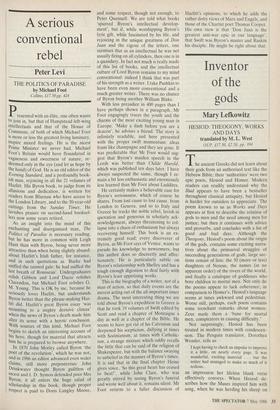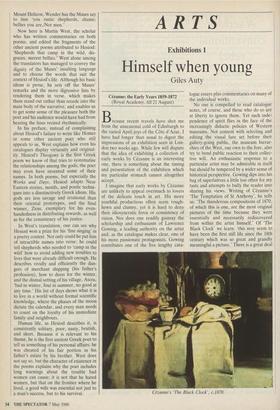Inventor of the gods
Mary Lefkowitz
HESIOD: THEOGONY, WORKS AND DAYS translated by M. L. West OUP, £17.50, £2.50, pp. 104 The ancient Greeks did not learn about their gods from an authorised text like the Hebrew Bible; their 'authorities' were two epic poets, Hesiod and Homer. Modern readers can readily understand why the Iliad appears to have been a bestseller throughout classical antiquity, but Hesiod is harder for outsiders to appreciate. The poem known to us as Works and Days appears at first to describe the relation of gods to men and the need among men for justice; but then it continues with advice and proverbs, and concludes with a list of good and bad days. Although the Theogony, Hesiod's poem about the origin of the gods, contains some exciting narra- tives about the primaeval struggles of succeeding generations of gods, large sec- tions consist of lists: the 50 (more or less) daughters of Nereus, the names (in no apparent order) of the rivers of the world, and finally a catalogue of goddesses who bore children to mortal men. Not only do the poems appear to lack coherence; in comparison to Homer's, Hesiod's language seems at times awkward and pedestrian. Worse still, perhaps, each poem contains some trenchant remarks about women: Zeus made them a 'bane for mortal men, conspirators in causing difficulty.'
Not surprisingly, Hesiod has been treated in modern times with condescen- sion. The Penguin translator, Dorothea Wender, tells us
I kept having to check an impulse to improve it a little, on nearly every page. It was wonderful, exciting material . . . but the writer had managed to make so much of it tedious,
an impression her lifeless blank verse effectively conveys. When Hesiod de- scribes how the Muses inspired him with song, when he was herding his sheep on Mount Helicon, Wender has the Muses say to him 'you rustic shepherds, shame; bellies you are,/Not men.'
Now here is Martin West, the scholar who has written commentaries on both poems, and edited the fragments of the other ancient poems attributed to Hesiod: 'Shepherds that camp in the wild, dis- graces, merest bellies.' West alone among the translators has managed to convey the dignity of the Muses' insulting language and to choose the words that suit the context of Hesiod's life. Although his basic idiom is prose, he sets off the Muses' remarks and the more digressive lists by rendering them in verse, which makes them stand out rather than recede into the main body of the narrative, and enables us to get some sense of the pleasure both the poet and his audience would have had from hearing the lines recited rhythmically.
In his preface, instead of complaining about Hesiod's failure to write like Homer or some other ancient poet who still appeals to us, West explains how even his catalogues display virtuosity and original- ity. Hesiod's Theogony is the first Greek poem we know of that tries to systematise the relationships among the gods; the poet may even have invented some of their names. In both poems, but especially the Works and Days, Hesiod adapts Near Eastern stories, motifs, and poetic techni- ques into a dinstinctively Greek idiom. His gods are less savage and irrational than their oriental prototypes, and the final winner, Zeus, exemplary for his even- handedness in distributing rewards, as well as for the consistency of his justice.
In West's translation, one can see why Hesiod won a prize for his 'fine singing' in a poetry contest. Not only could he put lists of intractible names into verse; he could tell shepherds who needed to 'camp in the wild' how to avoid adding new troubles to lives that were already difficult enough. He describes vividly and efficiently the dan- gers of merchant shipping (his father's profession), how to dress for the winter, and the dismal setting of his village, Ascra, 'bad in winter, foul in summer, no good at any time.' His list of days shows what it is to live in a world without formal scientific knowledge, where the phases of the moon dictate the calendar, and every man needs to count on the loyalty of his immediate family and neighbours.
Human life, as Hesiod describes it, is consistently solitary, poor, nasty, brutish, and short. Because it is relevant to his theme, he is the first ancient Greek poet to tell us something of his personal affairs: he was cheated of his fair portion in his father's estate by his brother. West does not say so, but the character of existence in the poems explains why the poet includes long warnings about the trouble bad women can cause; it is not that he hated women, but that on the frontier where he lived, a good wife was essential not just to a man's success, but to his survival.























































 Previous page
Previous page